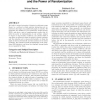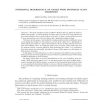5995 search results - page 59 / 1199 » Algorithmic Game Theory |
IJCAI
2003
15 years 2 months ago
2003
We describe algorithms for computing Nash equilibria in structured game representations, including both graphical games and multi-agent influence diagrams (MAIDs). The algorithms...
SIGECOM
2006
ACM
15 years 7 months ago
2006
ACM
We study a natural extension of classical evolutionary game theory to a setting in which pairwise interactions are restricted to the edges of an undirected graph or network. We ge...
106
click to vote
AI
2007
Springer
15 years 1 months ago
2007
Springer
We comment on the Shoham, Powers, and Grenager survey of multi-agent learning and game theory, emphasizing that some of their categories are important for economics and others are...
151
click to vote
GECCO
2010
Springer
15 years 1 months ago
2010
Springer
This paper takes an economic approach to derive an evolutionary learning model based entirely on the endogenous employment of genetic operators in the service of self-interested a...
111
click to vote
CORR
2006
Springer
15 years 1 months ago
2006
Springer
We study two-player games of infinite duration that are played on finite or infinite game graphs. A winning strategy for such a game is positional if it only depends on the current...



